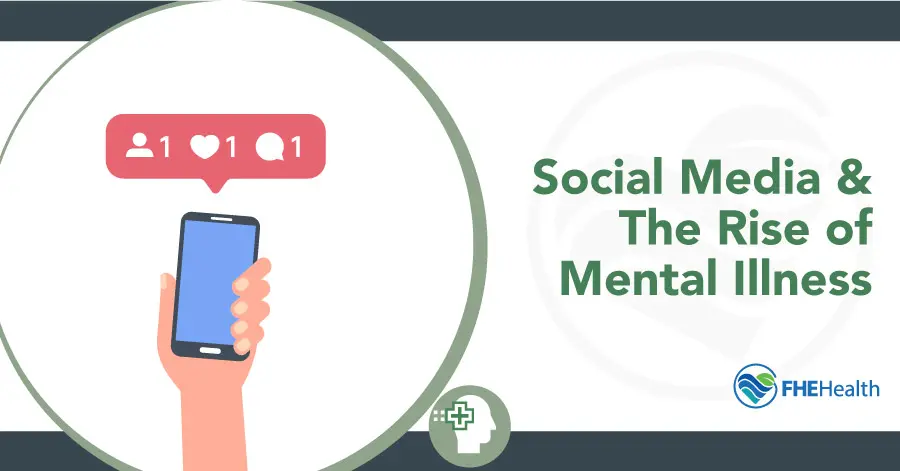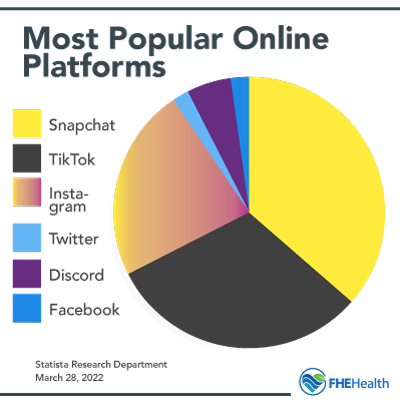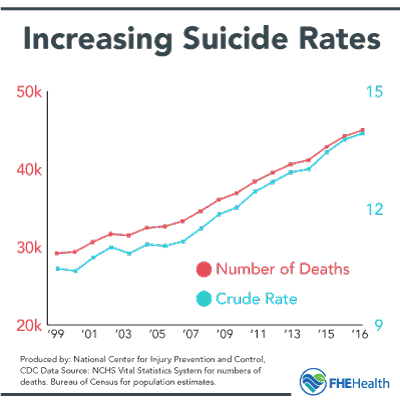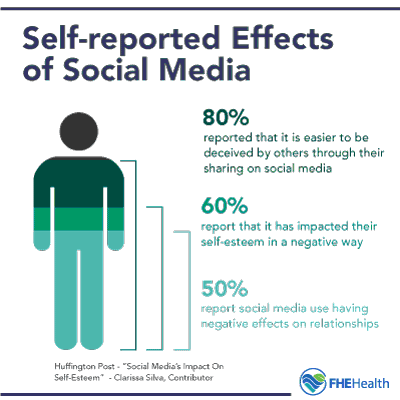
Updated March 16, 2022
The question of how social media use affects health continues to spur research. It’s also a source of some controversy. To be sure, social media has positive and negative effects on our behavior, but is social media to blame for a reported rise in mental illness?
The Big Picture of Social Media Use
 Even within the so-called “social media age” of the last decade, social media use has increased year-over-year. Data shows that global daily use of social media sites has increased from 90 minutes per day in 2012 to 135 — over two hours per day — in 2017.
Even within the so-called “social media age” of the last decade, social media use has increased year-over-year. Data shows that global daily use of social media sites has increased from 90 minutes per day in 2012 to 135 — over two hours per day — in 2017.
A Pew Research study gives more insight into how we use social media in America:
- Facebook is still the most heavily used social network, with 68 percent of Americans reporting that they use the site
- The 18 – 24 age group is the heaviest user of social media: 80 percent use Facebook, 78 percent use Snapchat, 71 percent use Instagram, and 45 percent use Twitter
Social media has changed our behavior most notably in the way we interact. The modern age sees social media giving us near-instant access to people around the world, which can be a good thing or a bad thing. On one hand, communication has never been easier, but social media gives us access to a more impersonal and anonymous form of interaction as well, eliminating the benefits of human contact.
Sites like Facebook and Twitter allow us to have instant access to the latest news, but as some studies have shown, being inundated with news can have negative effects on our mental health.
This suggests that social media may not be the healthiest for us, but is it playing a role in the increased prevalence of mental health disorders observed in the last few decades?
The Rise of Mental Illness
 It’s undeniable that more mental illnesses have been diagnosed in the last 20 or 30 years than ever before, but why? Is the medical community suddenly giving more credence to mental illness or are mental disease rates really increasing?
It’s undeniable that more mental illnesses have been diagnosed in the last 20 or 30 years than ever before, but why? Is the medical community suddenly giving more credence to mental illness or are mental disease rates really increasing?
The BBC has reported that the American suicide rate has risen by 25 percent between 1999 and 2016. A study in the European Journal of Counseling Psychology found that in the U.S., diagnoses of treatable mental diseases like depression were on the rise. A study published by Psychiatric Services explored the reasons why more and more Americans reported struggling from serious psychological distress (SPD), a non-diagnosis that provides a broader picture of mental health.
The conclusion is that yes, mental illness has increased, but we really don’t have a firm grasp on the degree to which the rise has occurred. Data is blurred by a few factors, including a decreased stigma of mental illness and more credibility being shown to these disorders by the medical community.
Is Social Media Having a Negative Impact on Our Psyche?
We’ve established that social media is being used more and more, and more diagnoses of mental illness are occurring, which can be considered a strong correlation, but is there causality? It’s time to attempt to answer the million-dollar question: what effect is social media having on our mental health?
The Opportunity Cost of Social Media Use
The first thing to note is that it’s not necessarily what people interact with on social media that influences mental health, but what they’re taking time away from to focus on social media.
One of the main activities that appear to be neglected in favor of screen time is family time. According to an empirical study by Igor Pantic, there is a reverse correlation drawn between time spent on social media and time spent engaging with family members, to the degree that may strain relationships with family or shrink the user’s circle of real-life relationships. This lack of a supportive social group can lead to anxiety and depression.
Another cost of excessive time on social media is less time spent sleeping. Most people check their social media presence as they go to bed. An Economist survey showed that on average, users of the four most popular social media sites reported that their sleep suffered the most as a result of social media overuse.
Social Media and Self-Esteem
 Our self-esteem suffers when we use social media too often as well. A study on social media usage by Dr. Axe shows that when users compare themselves to others or have constant access to what other members of their social circle are doing, their self-esteem (and in turn, their mental health) suffers.
Our self-esteem suffers when we use social media too often as well. A study on social media usage by Dr. Axe shows that when users compare themselves to others or have constant access to what other members of their social circle are doing, their self-esteem (and in turn, their mental health) suffers.
How Is Politics Tied to Social Media Use?
Political fatigue can also be a contributor to mental illness, so it’s pertinent to explore the ways in which social media has enhanced (or damaged) or access to rational political dialogues.
The positives: social media can open us up to a variety of viewpoints, and ultimately, alters our opinions in a more researched, rational direction.
Contrary to what many think, social media isn’t making us more politically polarized as a whole, but there is a deeper-lying danger of the anonymity of social media sites like Twitter: hateful extremism is being given a louder voice. This could have harmful effects on mental health and prompt negative political engagement through social networking.
Healthy Social Media Use
The National Alliance on Mental Illness (NAMI) is taking steps to recognize the effect that social media may have on our mental health and offers guidelines to mitigate these effects in the best way possible.
Limiting screen time and spending more time with friends and family in real life rather than over the internet is one way to have a healthy relationship with social media. Another is to try to always use social media for positive purposes, instead of falling into the trap of self-comparison or cyberbullying.
Social media has enormous potential because of the power it has given to society, and we have to use this power responsibly. Use social media to communicate as a way to share news and organize events and gatherings for the betterment of the community versus negative or possibly hurtful commentary.
FHE Health Can Help
Too much social media use can affect one’s ability to stay healthy, both physically and mentally. At FHE Health, we treat mental health as well as addiction, using cutting-edge behavioral science to diagnose and treat these disorders.






